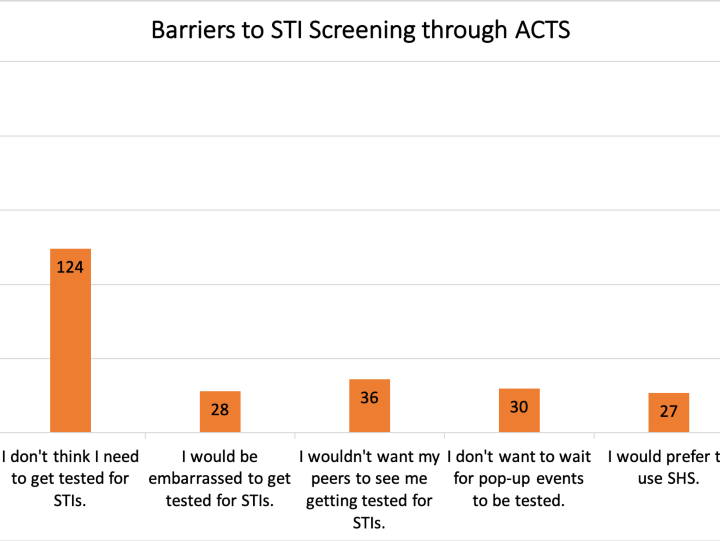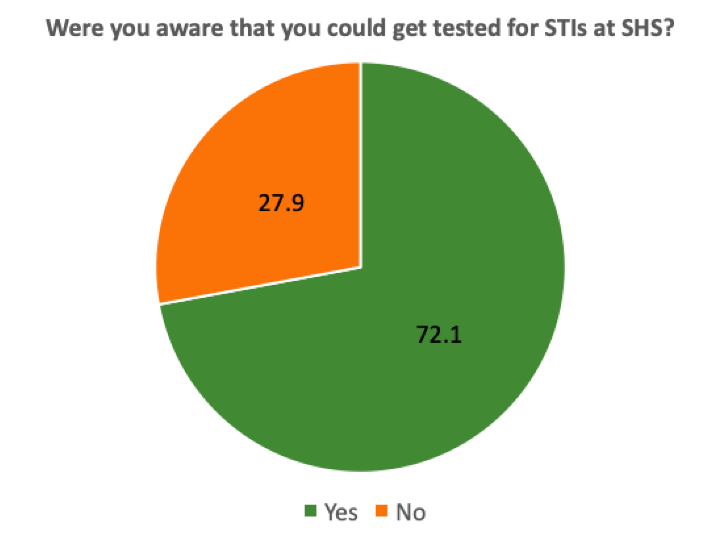
A Creative Initiative to Promote STI Testing Among College Students
Health, Safety, and Well-being Assessment, Evaluation, and Research Health, Safety, and Well-being Initiatives Wellness and Health Promotion
September 4, 2024
A college student is looking to get tested for sexually transmitted infections (STIs). She goes to the student health center on campus and is checking in for her appointment when she realizes one crucial detail: she is a dependent on her parents’ health insurance. Are they going to find out she got tested when they see their health insurance bill? She considers her three options.
- The first is to risk it, go through with the appointment, and hope her parents don’t see anything.
- The second option is to forgo billing her insurance for the appointment and testing, ultimately paying out of pocket. This option is not ideal because money is tight as a college student relying on loans.
- The third option is to skip getting tested altogether. This scenario is a reality for many college students trying to take control of their sexual health by getting tested for STIs.
None of these options are ideal— but what if there was another option?
STIs pose a significant burden on the United States, with 1 in 5 people having an STI in 2018, almost half of whom were aged 15-24 years old. To address this burden, in the Spring 2022 semester, the University of Miami Department of Wellness and Recreation initiated an ongoing partnership with a community organization to provide free, monthly STI screenings and risk assessments, as well as linkage to free treatment options. This organization is funded by the Florida Department of Health and the Ryan White CARE Act. These monthly events are conducted on campus and act as a supplement to the STI testing and treatment offered through the University of Miami Student Health Service.
One year after the start of this initiative, we surveyed around 450 students to assess their awareness and utilization of these two screening options, and to determine barriers they may face to using one or the other. Our findings reflected the different priorities that students may have when it comes to getting tested. For example, some students may prefer an option where they don’t have to bill their parents’ insurance, while others may prefer one that is available seven days a week.

Overall, awareness of the newer, free testing option was low, but intent to use this service was high among the students. It was particularly high among students aged 18-20, students on their family member’s insurance, and students identifying as LGBTQ+. Furthermore, LGBTQ+ students and Hispanic/Latino students recognized cost as a barrier to getting tested through the Student Health Service. These findings highlight populations that may benefit the most from providing a free STI screening option on college campuses.
Moreover, our survey found that only 72% of students knew they could get tested for STIs at the Student Health Service. This well-established health center provides many clinical services, including primary care, specialty referrals, mental health counseling, and yearly flu shots. However, not all students seem to know that these services include STI prevention and testing. Efforts should be made to ensure students are aware of their testing options through emails, flyers, and other promotional materials.

Overall, colleges and universities need to help fight the burden of STIs by encouraging testing among their students. Providing multiple testing options, including free services when feasible, and establishing partnerships with community organizations or government-funded agencies, are essential steps in promoting accessible and widespread STI testing. I urge all professionals engaged in higher education to examine the resources available to their student population and implement programs to improve testing. STI screening is (unfortunately) stigmatized enough as it is—we must work together to remove as many barriers as we can so that students never have to forgo STI testing.
Resources
Incidence, Prevalence, and Cost of Sexually Transmitted Infections in the United States, 2018
About the Author
 Julia Zukerberg is a fourth-year medical student in the combined MD/Masters in Public Health Program at the University of Miami Miller School of Medicine. She is currently in the process of applying to Obstetrics and Gynecology Residency Programs, through which she plans to continue advocating for improvements in STI screening and treatment. She can be reached at [email protected].
Julia Zukerberg is a fourth-year medical student in the combined MD/Masters in Public Health Program at the University of Miami Miller School of Medicine. She is currently in the process of applying to Obstetrics and Gynecology Residency Programs, through which she plans to continue advocating for improvements in STI screening and treatment. She can be reached at [email protected].